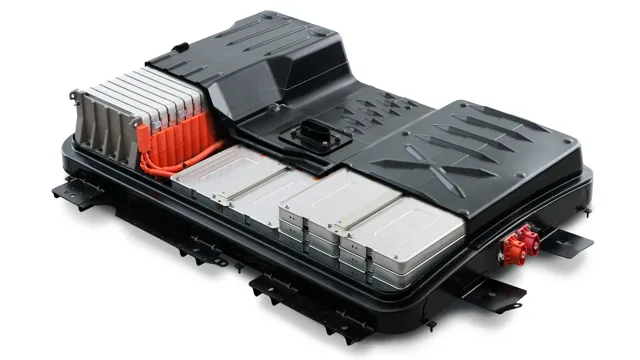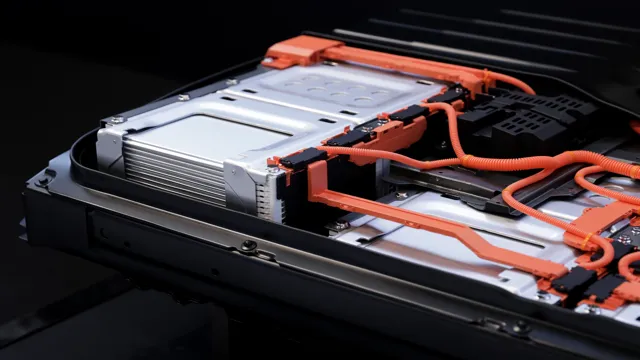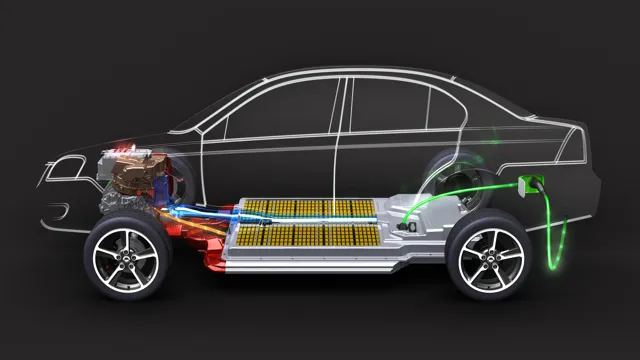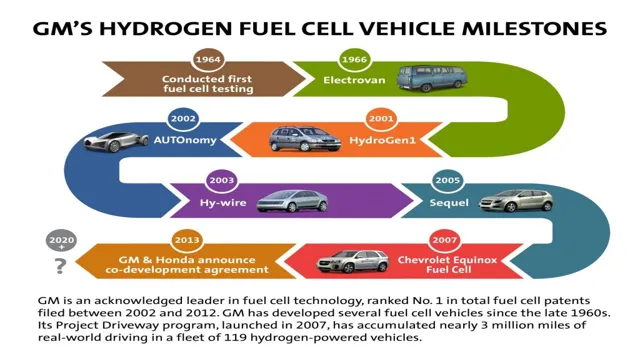The Journey to Uncovering the Ideal Average Size of Electric Car Battery
Are you curious about the size of the batteries that power electric cars? It’s a common question for anyone who is considering making the switch to an electric vehicle. With an increasing interest in reducing carbon emissions, more and more people are opting for electric cars. But, what about the batteries that propel these vehicles? How large or small are they, and how long do they last? In this blog post, we’ll take a closer look at electric car batteries and their average size.
We’ll explore why size matters, how it impacts the car’s range and performance, and what to look for when choosing an electric vehicle. So, let’s get started and debunk some myths around electric car batteries!
What is an Electric Car Battery?
The average size of an electric car battery can vary depending on the make and model of the vehicle. Most electric cars today have a battery pack that ranges from 40 kWh to 100 kWh. To put that in perspective, a Tesla Model S battery pack has a capacity of 100 kWh, while a Nissan Leaf has a capacity of 40 kWh.
The size of the battery has a direct impact on the car’s driving range. The larger the battery, the longer the car can travel on a single charge. However, it’s essential to note that the battery size isn’t the only factor that influences the car’s range.
Other factors such as the car’s weight, aerodynamics, and driving conditions can also affect how far it can travel. As the demand for electric cars increases and battery technology continues to improve, we can expect to see larger and more efficient batteries that offer even longer driving ranges.
Definition of Electric Car Battery
An electric car battery is the power source that makes an electric car move. It stores electricity that is used by the car’s electric motor to turn the wheels. The battery is made up of a series of cells that store energy in the form of chemical reactions.
These cells are connected by conductive material and are managed by an electronic control unit. Many electric car batteries are made of lithium-ion, which is a rechargeable battery that delivers high power and energy density. The battery’s range is one of the most important things to consider when choosing an electric car.
It determines how far the car can go before needing to recharge, and it varies depending on the make and model. Some electric cars have a range of over 300 miles, while others may only last for 100 miles on a single charge. Overall, an electric car battery is a sophisticated and complex part of the vehicle that is crucial to its performance and sustainability.
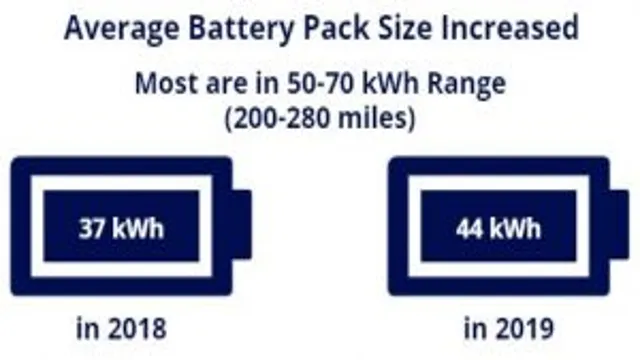
Factors That Affect Electric Car Battery Size
When it comes to electric cars, battery size plays a crucial role in determining factors such as driving range, performance, and charging time. The average size of an electric car battery varies depending on a number of factors. One of the most important factors is the size and weight of the car itself.
Larger cars require larger batteries to power them, while smaller cars can get away with smaller batteries. Another factor is the desired driving range of the car. If a car is intended for long-distance driving, it will require a larger battery to ensure that it can make it to its destination without needing to be recharged.
Additionally, the type of battery technology used in the car can have an impact on the size of the battery. For example, newer battery technologies such as solid-state batteries are more energy-dense and can store more energy in a smaller size. Overall, the average size of an electric car battery will continue to evolve as battery technology improves and electric cars become more mainstream.
Type of Electric Car
When it comes to electric cars, battery size is one of the most crucial factors to consider. The type of electric car plays a significant part in determining the battery size needed. For example, a smaller, more compact electric car will require a smaller battery compared to a bigger electric SUV.
The driving habits and style of the driver are also essential factors that affect the battery size of electric cars. Frequent acceleration and braking can drain the battery faster, and driving on highways at high speeds can also affect the range. Additionally, the efficiency and power of the electric motor play a significant role in battery size.
The more powerful the motor, the bigger the battery size required. Ultimately, the battery size of an electric car is affected by various factors, but it’s essential to note that car manufacturers are continually working on improving battery technology to increase range and efficiency.
Battery Capacity
Electric car battery size depends on various factors that affect its capacities. One of the essential factors is range. The range requirement determines the battery size, motor power, and electric consumption of the car.
In addition, battery size depends on the vehicles’ weight and size, as heavier cars require more energy to move around. Battery chemistry also plays a major role in determining the battery size. Lithium-ion batteries are the most common type for electric vehicles due to their high energy density, which allows them to store more capacity in a smaller unit.
Another critical factor that affects battery size is driving conditions, including terrain, traffic, and driving style. Rapid acceleration, constant driving at high speeds, and extreme weather can decrease battery range, prompting a bigger battery for longer trips. Therefore, several factors affect electric car battery size, and choosing the right size requires considering all of them thoroughly.
Driving Range
When it comes to electric cars, one of the critical factors affecting their driving range is the size of their batteries. The battery size directly impacts how much energy the car can store and how much distance it can travel on a single charge. However, several factors determine what battery size you need for your electric car.
The first factor is the size of the car itself, as larger cars require bigger batteries to power them. Additionally, the driving conditions and climate in which you’ll primarily drive your electric car play a significant role in determining the necessary battery size. Extreme conditions, such as cold weather, can decrease a battery’s storage capacity and performance, meaning that you’ll need a larger battery to compensate.
Another critical factor is your driving habits and how you use your car. If you tend to drive long distances regularly, you might need a bigger battery to ensure that you don’t run out of charge too quickly. Ultimately, the battery size you’ll need for your electric car will depend on various factors, but it’s essential to consider each one to determine the best option for your needs.
Charging Technology
When it comes to electric cars, the size of the battery plays a crucial role in determining the range of the vehicle. Various factors can affect the size of the battery, including the type of charging technology used. The most common charging technology for electric cars is Level 2 charging, which provides a charging rate of 240 volts, making it a safe and convenient option for households.
However, Level 3 charging, also known as DC fast charging, can significantly reduce the charging time for electric vehicles. This technology is more powerful than Level 2 charging and uses direct current to recharge the battery at a rapid pace. Other factors that can influence the size of an electric car battery include the weight of the car, the driving habits of the driver, and the temperature conditions under which the vehicle is operated.
So, while the size of the battery is an essential factor to consider when purchasing an electric car, it’s not the only one. Drivers should also consider the charging technology, driving habits, and other factors that can affect the overall efficiency and performance of the vehicle.
Average Size of Electric Car Battery
When it comes to the average size of electric car batteries, it can vary greatly depending on the make and model. However, as a general rule, most electric vehicles have batteries that range from 30 to 100 kilowatt-hours (kWh). For example, the popular Tesla Model 3 has a 75 kWh battery, while the Nissan Leaf has a 40 kWh battery.
These batteries are much larger than traditional car batteries, but they need to be in order to power the electric motor and allow for enough range to be useful in day-to-day driving. The size of the battery pack also impacts the overall weight and efficiency of the vehicle, so automakers must carefully balance battery size with other performance factors to create an optimal driving experience for consumers. As technology continues to improve, the average size of electric car batteries is likely to increase, allowing for even greater range and reliability in the future.
Data on Average Size of Today’s Electric Cars
Electric cars have become increasingly popular in recent years, with more and more people choosing them as a more sustainable and environmentally friendly alternative to traditional gasoline-powered vehicles. One important factor to consider when looking at electric cars is the average size of their battery. The size of an electric car battery can have a significant impact on the vehicle’s range and overall performance.
On average, today’s electric cars have batteries ranging from 40 kWh to 100 kWh, with higher-end luxury models offering even larger batteries. However, it’s important to note that the size of an electric car battery doesn’t necessarily correlate to its efficiency or range. Other factors such as the car’s weight, aerodynamics, and motor efficiency can also play a role in determining the vehicle’s overall performance.
As electric cars continue to evolve and technology improves, we can expect to see even more advancements in battery size and efficiency in the coming years.
Comparison with Traditional Car Batteries
When comparing electric car batteries to traditional car batteries, one of the biggest differences is in the average size. Electric car batteries are much larger than traditional car batteries due to the sheer amount of energy required to power an electric car. While traditional car batteries typically have a capacity of around 12 volts, electric car batteries can have capacities upwards of hundreds of volts.
This is necessary to provide the range necessary for an electric car to be practical for daily use. The larger size of electric car batteries also means that they are heavier than traditional car batteries, adding to the overall weight of the car. Despite these differences, electric car batteries have many advantages over traditional car batteries, such as greater efficiency, lower maintenance costs, and a reduced impact on the environment.
Conclusion
In conclusion, the size of electric car batteries can vary widely, from a compact and efficient Fit EV to a luxurious and powerful Tesla Model S. But one thing they all have in common is their ability to drive us confidently into a more sustainable future. So instead of worrying about the size of your battery, focus on the joy of cruising past gas stations and leaving a smaller carbon footprint in your wake.
As the saying goes, it’s not the size of the battery that matters, it’s how you drive it!”
FAQs
What is the average size of an electric car battery?
The average size of an electric car battery is around 60-100 kWh.
How long does it take to charge an electric car battery?
The time it takes to charge an electric car battery will depend on the battery’s size, the charger’s power output, and the vehicle’s capacity. Generally, it takes around 30 minutes to an hour to charge an electric car battery to 80% capacity with a fast charger.
What is the average lifespan of an electric car battery?
The average lifespan of an electric car battery is around 8-10 years or approximately 100,000 miles, but this can vary based on how the battery is used and cared for.
Can you replace an electric car battery?
Yes, an electric car battery can be replaced, but the cost of replacement can be quite high. It’s important to properly care for and maintain the battery to prolong its lifespan and avoid the need for replacement.
